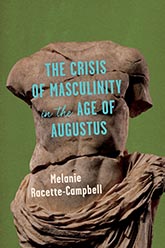|
The Crisis of Masculinity in the Age of Augustus
Melanie Racette-Campbell
Wisconsin Studies in Classics Imprint
“Melanie Racette-Campbell provides deft analysis and brilliant close readings about how the Augustan poets mobilized their understanding of Roman masculinity in response to life in the new regime. Highly recommended for anyone interested in ancient Roman sexuality and gender or the intersection of political history and gendered norms.”
—Charles Goldberg, Bethel University
How Roman manhood was redefined
The political rupture caused by the ascension of Augustus Caesar in ancient Rome, which ended the centuries-old Republic, had drastic consequences for the performance and understanding of masculinity in a markedly androcentric society. Previously, masculinity was established and maintained through the frame of competition, in both public and private spheres—but the total accumulation of power by one man foreclosed most avenues of, and even appreciation for, competition. Melanie Racette-Campbell examines how Rome’s elite men navigated this liminal moment between Republic and Empire, and shows that the process was neither linear nor uniform.
Already in the late Republic, prior to Augustus’s rise to power, cracks in the hegemonic concept of masculinity were starting to show. Careful reading of contemporary texts reveals a decades-long process as tumultuous and unsteady as the political events they echoed, one in which multiple and competing strategies for reconceiving the nature of masculinity were tested, employed, discarded, and adopted in a complex public-private discourse. The eventual reconstitution of a definition of Roman manhood was not easily agreed upon. Masculinity in both the Republic and the Empire are well studied subjects, but by shining a light on the precise moment of transition Racette-Campbell unveils the precise complexity, contours, and nuances of the Augustan crisis of masculinity.
 Melanie Racette-Campbell is an assistant professor of classics at the University of Winnipeg. She is coeditor of the forthcoming volume Toxic Masculinity in the Ancient World.
Melanie Racette-Campbell is an assistant professor of classics at the University of Winnipeg. She is coeditor of the forthcoming volume Toxic Masculinity in the Ancient World.
Praise
“A welcome addition to our developing awareness of how masculinity was constructed, challenged, reconsidered, and performed by the literary elite in the Late Republic and early Principate. . . . A study that is both expansive and tightly controlled, with fresh readings of early imperial poetry that avoid claiming too much. . . . Racette-Campbell’s translations and assessments feel innovative and germane.”
—Bryn Mawr Classical Review
Table of Contents
Contents
Acknowledgments
Introduction: Augustus and the End of Republican Masculinity
Chapter 1: Catullus and Cicero: Word Play in the Ruins
Chapter 2: Virtus under the Principate
Chapter 3: Resistance through Authority
Chapter 4: Disengagement through the Recusatio
Chapter 5: Speaking through the Gods
Conclusion: After Augustan Masculinity
Notes
References
Index Locorum
Index
|

Larger images
July 2023
LC: 2022042405 DG
274 pp. 6 x 9
|

